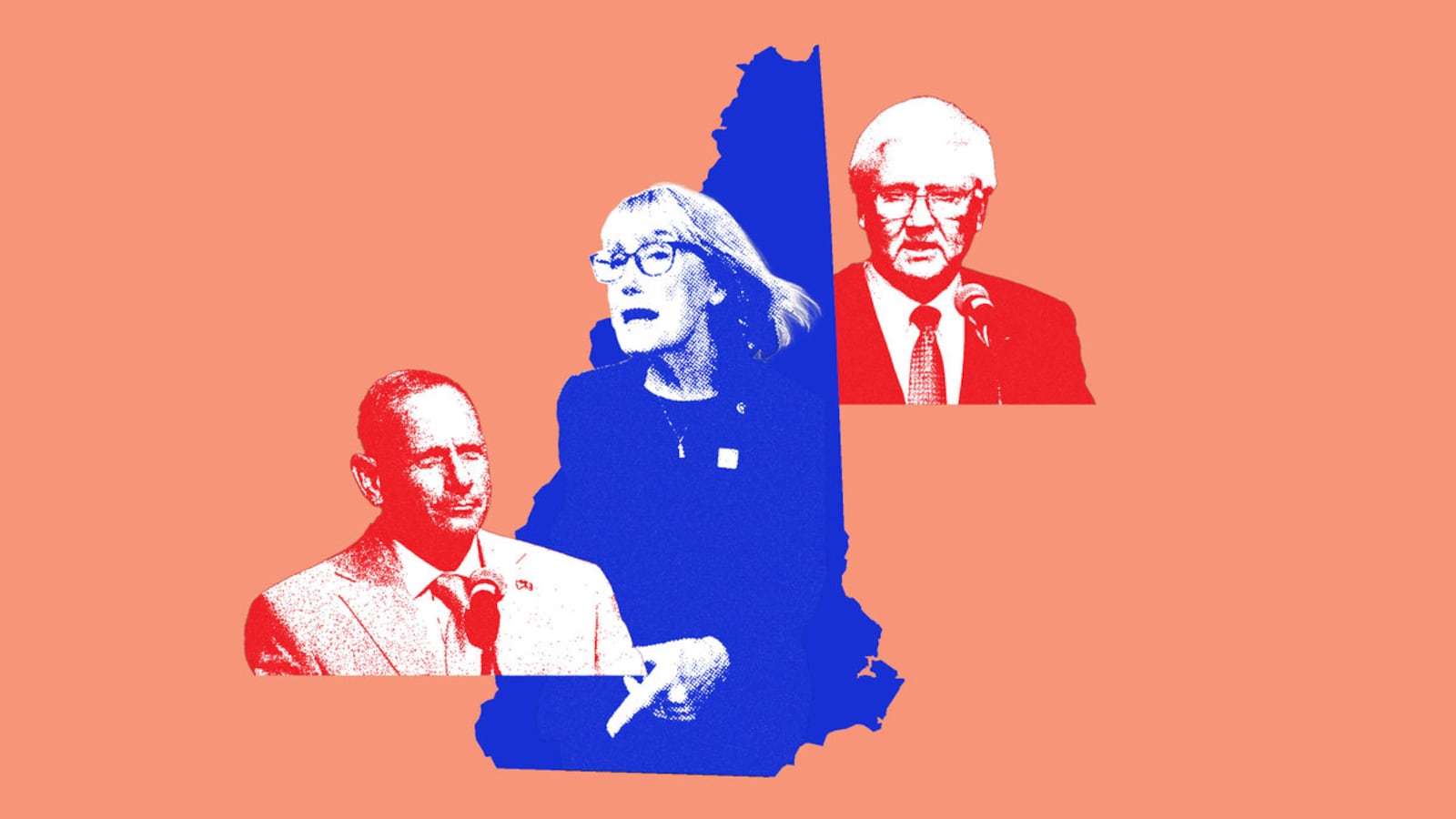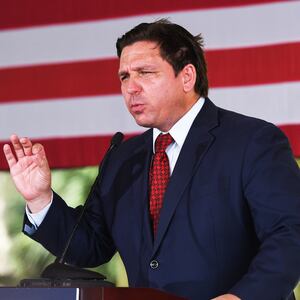It wasn’t long ago that New Hampshire—the fiercely independent, perennial political battleground—was shaping up to be one of the brightest spots for the GOP on the 2022 midterm map.
Republicans saw Sen. Maggie Hassan, the first-term Democratic incumbent, as an easy target who could pave the way to their recapture of the U.S. Senate majority. So did the press: a March 2021 headline from the Boston Globe blared that Hassan was “the most vulnerable Senate Democrat up for re-election.”
But more than a year later, that claim has aged about as well as a Bobby Jindal for President bumper sticker.
After party leaders failed to recruit the state’s popular GOP governor, Chris Sununu, to challenge Hassan, Republicans watched queasily as a squabbling field of subpar hopefuls failed to catch fire during the primary campaign.
As Granite State voters head to the polls on Tuesday for this race’s primary, the leading candidates are Don Bolduc, a bombastic retired general who has embraced the MAGA wing of the party, and Chuck Morse, a leader in the New Hampshire state senate who is more aligned with the establishment.
Top Republicans fear a Bolduc win would all but eliminate their chances to win a state they once viewed as ripe for the flipping. Glaringly, his campaign has under $90,000 in the bank heading into the primary. Hassan, who has raised a staggering $26 million in the last two years, is sitting on a $7.3 million warchest.
Asked if he had concerns about the outlook of Republicans in New Hampshire, Sen. John Cornyn (R-TX)—a former chair of the Senate GOP’s official campaign arm—had a quick answer.
“I do,” said Cornyn, who called Bolduc “not our best nominee.”
“It would be a shame to nominate somebody who can't win in the general election,” the Texas senator told The Daily Beast. “I'm afraid that would be the case for the leading candidate right now.”
Democrats, meanwhile, have been left marveling at the shambolic display of a GOP primary that will culminate next week. “This whole thing has been a shitshow,” said a New Hampshire Democratic strategist, who requested anonymity to discuss private conversations about the race.
“They never had Sununu, they had no plan B, no plan C, nobody got in for two months,” the strategist said. “It was literally just Don Bolduc. In January you had a bunch of people get in, they all ate each other’s fundraising and support, and nobody took off.”
It’s not out of the question that GOP fortunes could quickly change. While Hassan has comfortably led her prospective challengers in public polls, her own approval ratings have been far from sterling. An August poll from St. Anselm College found that only 39 percent of New Hampshire voters felt Hassan deserved re-election.
Sen. Rick Scott (R-FL), the chairman of the National Republican Senatorial Committee, argued New Hampshire remains very much within the GOP’s reach and insisted “we have great candidates.”
“We’re going to win,” Scott told The Daily Beast on Thursday. “[Hassan] has spent 7 or 9 million bucks and she’s still in the low 40s in approval? That’s a pretty good pickup.”
But with Republicans struggling to make up ground in other must-win Senate races—like Pennsylvania, Arizona, or Georgia—it seems plausible that very little of the party’s increasingly finite dollars could make their way to New Hampshire. If that happens, Democrats’ difficult path to retaining the Senate majority could get a lot easier.
“New Hampshire’s B-tier GOP candidates are embroiled in a chaotic, nasty primary,” said Amanda Sherman-Baity, a spokesperson for the Democratic Senate Campaign Committee. “Whatever damaged candidate manages to limp out will be held accountable for their out-of-step and anti-choice positions.”
In a statement to The Daily Beast, Hassan campaign spokesman Kevin Donohue indicated the Democratic senator would be more than comfortable taking on whoever emerges from the GOP primary.
“This fall, we’ll draw a sharp contrast between Senator Hassan's record of fighting for Granite Staters and the fact that the eventual Republican nominee would just be a yes vote for Big Pharma, Big Oil, and a nationwide abortion ban,” Donohue said.
But there’s little secret that Democrats would prefer to face Bolduc—and they’ve made moves to try to secure that matchup.
In the final weeks of the primary campaign, Senate Majority PAC, an outside group aligned with Majority Leader Chuck Schumer, bankrolled an ad campaign bashing Morse as a “sleazy politician” handpicked by GOP leader Mitch McConnell. That spending came in response to a frenzied, last-minute spending push from GOP groups to prop up Morse.
Democratic campaign groups have drawn criticism—both internally and externally—for spending money to boost extreme candidates in GOP primaries elsewhere. While the timing of the Senate Majority PAC ads was no doubt deliberate, many Democrats were comfortable with the strategy because those attacks would be appropriate in a general election campaign against Morse.
Bolduc has used the outside groups’ involvement as a foil to boost his own credentials. In a statement, campaign spokesman Jimmy Thompson said the race is “a contest between the career politicians on both sides and outsiders offering a fresh perspective.”
“There is a reason that General Bolduc’s message is resonating,” Thompson said. “There are forces at play that transcend any endorsement or attack ads: it’s about which candidate promises to reverse course from the failed status quo.”
Indeed, the question of two endorsements have loomed large over the GOP primary: that of Sununu, and that of former President Donald Trump.
After holding off for most of the campaign, Sununu endorsed Morse on Thursday, while Trump has yet to make a pick. Rumors that Sununu—whose decision not to enter the race himself still raises the blood pressure of national Republicans—has been pushing Trump to back Morse also fueled the fire.
Sununu’s office issued a statement on Tuesday to clear the air over rumors that he’s been pushing Trump to endorse Morse.
"For the record, the governor did not call President Trump,” a Sununu spokesman told the New Hampshire Union-Leader. “President Trump called Governor Sununu, and the Senate race came up as part of a larger [conversation]. The governor encouraged the President to take a look at the Senate race."
Last week, Trump pontificated about the race during a call-in interview with conservative talk radio host John Fredericks, who’s backing Bolduc.
“I'm looking at that race very closely,” Trump said. “[Bolduc] said some great things, strong guy, tough guy. I think he's doing very well, too. I hear he's up, he's up quite a bit.” (The Real Clear Politics average of polling in the race has Bolduc up by 18.5 percentage points.)
Trump also appeared surprised to hear about the outside spending in the race from McConnell’s PAC in favor of Morse. (“Wow, okay. Well, I'm looking at it,” Trump said. “I'm glad you told me that.”)
With Sununu and the establishment Republicans in the state largely lining up behind Morse—with his tenure in the statehouse going back to 1998—frustration among the MAGA wing has begun to boil over.
Despite Sununu’s status as one of the most popular governors in the country, the Trump takeover has steered the state party’s focus away from his pro-business agenda to the same culture wars fueling the MAGA base nationwide.
Even with control of both chambers of the 424-member state legislature, and after earning concessions from Sununu, such as his support over a late term abortion ban in the state budget—which could have been his biggest liability if he had jumped in the race—frustrations lingered from Sununu’s prior clashes with Trump.
The vitriol toward the governor from the hardline wing became a force Bolduc could harness. The retired general once called the third-term governor a “communist Chinese sympathizer” and accused the Sununu family business of supporting terrorism.
“I derailed Gov. Sununu from running for Senate,” Bolduc said in a November 2021 talk radio interview. “Let’s face it—the most powerful political family in New Hampshire made a decision not to run against a political outsider for the United States Senate.”
Bolduc described running “a Sun Tzu-like campaign” that he claimed spooked Sununu out of a run. The governor wasn’t having it.
“He’s not a serious candidate, he’s really not, and if he were the GOP nominee I have no doubt we would have a much harder time,” Sununu said in response to Bolduc. “He’s kind of a conspiracy theorist-type candidate.”
Despite Bolduc talking a tough game, Sununu’s brand is the strongest the Republicans have by a long stretch in the Granite State, Andrew Smith, the director of the University of New Hampshire Survey Center explained.
“It’s Sununu and nobody,” Smith told The Daily Beast. “They don’t have a second string here, they don’t have a bench.”
Even with Hassan’s lower approval rating and the overall national climate not favoring Democrats with the economy, Smith said Hassan remains in “pretty decent shape” as the favorite in November.
“She has always been not as exceptionally popular, even as a governor or a senator,” Smith said, compared to Sen. Jeanne Shaheen, her fellow Granite State Democrat. “Not necessarily unpopular, but kind of nondescript.”
With the generational name recognition and three statewide victories under his belt, Sununu would have “a good chance of winning” if he had decided to run, Smith added.
As they look to November, many national Republicans have a hard time not returning to Sununu’s decision to take a pass on the Senate.
“Recruiting is everything,” said Cornyn. “If we’d been able to get the governor… I think things would be looking a little bit differently. But we’ve got to play the hand we’re dealt.”










